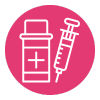Addiction Detox
Detox is the process of removing harmful substances from your body and breaking your physical dependence on drugs or alcohol. It is a crucial aspect of addiction recovery and a vital step towards reclaiming your life.
While addiction detox can be a daunting prospect, there are many common misconceptions about the process. When you complete detox under medical guidance at a professional detox centre like Banbury Lodge, you can be assured that you will get the support you need to stay safe and comfortable.
What is detox for?
Addiction has both psychological and physical elements. Physical dependence is caused by changes in the brain’s neurotransmitter systems. These changes are a result of repeated substance use which can alter the brain’s reward pathways and trigger the release of excessive amounts of neurotransmitters like dopamine. As a result, the brain becomes conditioned to the presence of drugs or alcohol, and without them, it is unable to function normally.
Detox helps to break physical dependence on addictive substances by eliminating them from the body and allowing the brain to reset its chemistry. It is a crucial aspect of effective recovery as it provides a clean slate for you to focus on the psychological side of the condition without being distracted by physical cravings or withdrawal symptoms.
At Banbury Lodge detox centre, we provide inpatient, medical detox for a number of substances including:
Alcohol Detox
Alcohol detox involves medically supervised treatment to help individuals safely withdraw from alcohol, managing withdrawal symptoms like anxiety, tremors, and seizures. Banbury Lodge offers expert care and a supportive environment to ensure a safe detox process, helping individuals regain physical stability.
Drug Detox
Drug detox is a process of clearing drugs from the body, focusing on minimizing withdrawal symptoms and physical dependence. Banbury Lodge provides comprehensive detox programs, with professional support to manage symptoms and prevent relapse, offering a strong foundation for recovery. Click to learn more about Drug detox.
Prescription Drug Detox
Prescription drug detox helps individuals safely discontinue use of prescription medications, particularly painkillers and benzodiazepines. Banbury Lodge’s experienced team offers tailored detox plans to ease withdrawal symptoms, ensuring a safe and supportive environment for individuals to regain control over their lives.
Opiate Detox
Opiate detox involves medical care to help individuals withdraw from opioids like heroin or prescription painkillers. Banbury Lodge provides specialized treatment to manage intense withdrawal symptoms and offers a compassionate, structured detox program to support long-term recovery. Click to learn more.
What are the benefits of detox for addiction?
Addiction detox programmes provide a number of benefits for those struggling with substance abuse and dependency, including:
- Reduction of withdrawal symptoms
- Improved physical and mental health
- The clearing of toxins from the body
- Resetting the brain’s chemistry
- Strong foundations for further recovery treatment
What are common addiction detox withdrawal symptoms?
Withdrawal occurs when you stop using drugs or alcohol and there is a chemical imbalance while your body recovers and gets used to not having the substances in your system. Withdrawal symptoms vary depending on the substance used and can range both in severity and duration. Some common withdrawal symptoms include:
- Anxiety
- Depression
- Confusion
- Irritability
- Fatigue
- Sweating
- Insomnia
- Lethargy
- Nausea and vomiting
- Muscle aches
- Seizures (in severe cases)
How to detox safely
The withdrawal symptoms of some substances can be dangerous and potentially even fatal so it is crucial that you detox under the guidance of medical professionals like the team at Banbury Lodge detox centre. Attempting to detox at home on your own means that you won’t have anyone with the skills and experience required if something goes wrong.
Here are some of the benefits of undergoing a detox programme at Banbury Lodge:
- Medical assessment: Upon admission to Banbury Lodge, you will be given a full medical assessment to determine your specific needs and any underlying health conditions. This information will then be used to create a personalised detox plan and to ensure your safety and comfort during the detox process.
- Medical supervision: Our medical professionals are trained to help you manage withdrawal symptoms and can provide medication as needed to make the process more comfortable.
- A safe and controlled environment: Detoxing in a professional detox centre provides a safe and controlled environment, reducing the risk of adverse events and ensuring your comfort and well-being.
- Nutrition and hydration: Good nutrition and hydration are crucial during the detox process so you will be provided with healthy meals and encouraged to drink plenty of water to help your body heal.
- Preparation for the next steps: Addiction detox is just the first step in the recovery process so you will be given guidance and support as you prepare for the other aspects of your recovery treatment.
Can detox cure substance addiction?
While detox is an important part of the recovery process, it does not address any underlying causes of addiction or how to manage cravings, without which, recovery is not possible. Alongside addiction detox at Banbury Lodge, you will also begin a rehab treatment programme to address the psychological, emotional and behavioural aspects of your dependency and build the skills and tools you need for a successful and lasting recovery. Our programmes involve a combination of individual and group therapies as well as holistic treatment programmes to heal your mind, body and soul.
After leaving our detox centre, you will then begin your aftercare programme. This is an important component of the recovery process and involves weekly group therapy sessions for a year which provide ongoing support and accountability as you continue on your recovery journey.
Easing common fears about addiction detox
Undergoing a detox programme can be a daunting process, and it is common for individuals to have fears and concerns about the process. However, it is important to understand that many of these fears are based on misconceptions. Here are some common fears and the truth behind them:
Withdrawal will be too painful to bear
Withdrawal can be uncomfortable but it is not usually painful. ymptoms vary depending on the substance used and can range from mild to severe. However, our medical professionals are trained to manage withdrawal symptoms and medication can be prescribed to make the process more comfortable.
I will just relapse straight after detox
Relapse is a common concern for individuals in recovery but it is far from a foregone conclusion. With the right support, addiction detox can help you to break the cycle of dependency and set the foundation for a successful and lasting recovery.
I will be judged for needing detox for addiction
Neither the staff nor other clients at Banbury Lodge will judge you for your dependency issues. Our goal is to help you overcome your dependency and go on to live a healthy, happy life and everyone at Banbury Lodge works together towards that goal.
How to help a loved one who is going through detox
There is no more powerful force in recovery than the support of loved ones. If you have a friend or family member who is about to begin an addiction detox programme, here are some important ways you can help them:
How to begin a detox programme at Banbury Lodge
Are you struggling with a substance dependency and looking to get started on your recovery journey? Get in touch with Banbury Lodge today and we can give you more information about our detox for addiction programmes and help you begin the process.
Frequently asked questions









